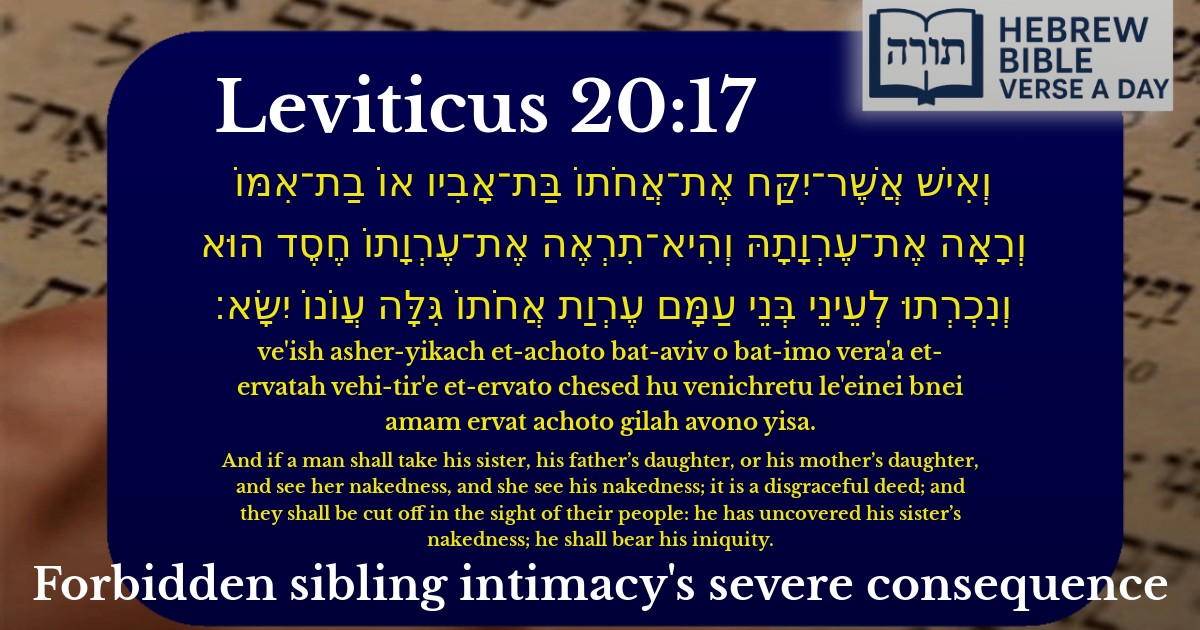Join Our Newsletter To Be Informed When New Videos Are Posted
Join the thousands of fellow Studends who rely on our videos to learn how to read the bible in Hebrew for free!
Hebrew Text
וְאִישׁ אֲשֶׁר־יִקַּח אֶת־אֲחֹתוֹ בַּת־אָבִיו אוֹ בַת־אִמּוֹ וְרָאָה אֶת־עֶרְוָתָהּ וְהִיא־תִרְאֶה אֶת־עֶרְוָתוֹ חֶסֶד הוּא וְנִכְרְתוּ לְעֵינֵי בְּנֵי עַמָּם עֶרְוַת אֲחֹתוֹ גִּלָּה עֲוֺנוֹ יִשָּׂא׃
English Translation
And if a man shall take his sister, his father’s daughter, or his mother’s daughter, and see her nakedness, and she see his nakedness; it is a disgraceful deed; and they shall be cut off in the sight of their people: he has uncovered his sister’s nakedness; he shall bear his iniquity.
Transliteration
Ve'ish asher-yikach et-achoto bat-aviv o bat-imo vera'a et-ervatah vehi-tir'e et-ervato chesed hu venichretu le'einei bnei amam ervat achoto gilah avono yisa.
Hebrew Leining Text
וְאִ֣ישׁ אֲשֶׁר־יִקַּ֣ח אֶת־אֲחֹת֡וֹ בַּת־אָבִ֣יו א֣וֹ בַת־אִ֠מּ֠וֹ וְרָאָ֨ה אֶת־עֶרְוָתָ֜הּ וְהִֽיא־תִרְאֶ֤ה אֶת־עֶרְוָתוֹ֙ חֶ֣סֶד ה֔וּא וְנִ֨כְרְת֔וּ לְעֵינֵ֖י בְּנֵ֣י עַמָּ֑ם עֶרְוַ֧ת אֲחֹת֛וֹ גִּלָּ֖ה עֲוֺנ֥וֹ יִשָּֽׂא׃
וְאִ֣ישׁ אֲשֶׁר־יִקַּ֣ח אֶת־אֲחֹת֡וֹ בַּת־אָבִ֣יו א֣וֹ בַת־אִ֠מּ֠וֹ וְרָאָ֨ה אֶת־עֶרְוָתָ֜הּ וְהִֽיא־תִרְאֶ֤ה אֶת־עֶרְוָתוֹ֙ חֶ֣סֶד ה֔וּא וְנִ֨כְרְת֔וּ לְעֵינֵ֖י בְּנֵ֣י עַמָּ֑ם עֶרְוַ֧ת אֲחֹת֛וֹ גִּלָּ֖ה עֲוֺנ֥וֹ יִשָּֽׂא׃
🎵 Listen to leining
Parasha Commentary
📚 Talmud Citations
This verse is quoted in the Talmud.
📖 Sanhedrin 54a
The verse is discussed in the context of the prohibitions against incest, specifically regarding relations with one's sister.
📖 Yevamot 55a
The verse is referenced in a discussion about the severity of incestuous relationships and the consequences outlined in the Torah.


Prohibition of Incest with a Sister
The verse (Vayikra 20:17) prohibits intimate relations with one's sister, whether she is the daughter of one's father or mother. The Torah describes this act as "חֶסֶד" (chesed), which Rashi interprets as "a disgraceful deed" (based on Targum Onkelos). The term "chesed" here is understood in a negative sense, meaning an act of brazenness and impropriety, contrary to its usual positive connotation of kindness.
Severity of the Transgression
The punishment for this sin is "וְנִכְרְתוּ" (venichretu)—being "cut off" from the Jewish people, either through premature death or spiritual excision (Rambam, Hilchot Issurei Bi'ah 1:6). The phrase "לְעֵינֵי בְּנֵי עַמָּם" (before the eyes of their people) emphasizes that this sin is not only a private matter but also a public desecration of moral boundaries.
Halachic Implications
Moral and Social Dimensions
The Midrash (Vayikra Rabbah 24:6) teaches that such relationships corrupt the moral fabric of society, as they blur the sacred distinctions between family members. The Torah’s emphasis on "חֶסֶד" in this context highlights how an act that should embody familial love and protection is instead perverted into an immoral transgression.
Contrast with Non-Jewish Practices
Ramban (Nachmanides) notes that this prohibition distinguishes the Jewish people from ancient societies where such unions were sometimes permitted among nobility (e.g., Egyptian royalty). The Torah’s laws elevate the sanctity of family structure, ensuring moral purity.